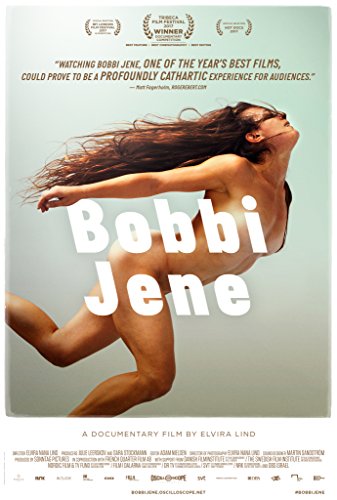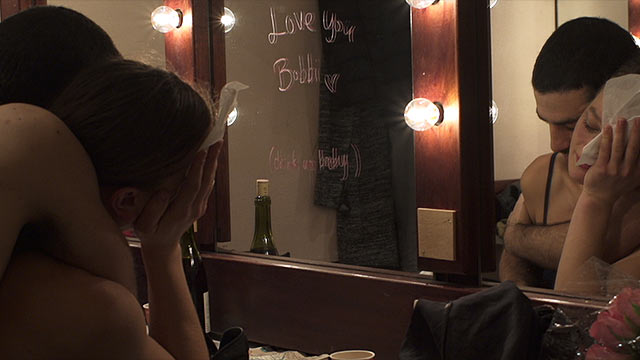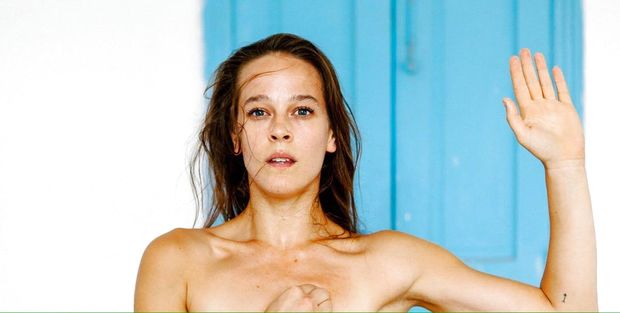by Glenn Dunks
 Who is worthy of a documentary about themselves is a question that comes up a lot when watching and occasionally writing about documentaries. A long life doesn’t necessarily make you any worthier of one, just as youth doesn’t imply unworthiness. Of course, who is a worthy subject is ultimately in the eye of the beholder so to speak and it is the film itself is what should be judged.
Who is worthy of a documentary about themselves is a question that comes up a lot when watching and occasionally writing about documentaries. A long life doesn’t necessarily make you any worthier of one, just as youth doesn’t imply unworthiness. Of course, who is a worthy subject is ultimately in the eye of the beholder so to speak and it is the film itself is what should be judged.
I am sure there was a reason that director Elvira Lind chose to follow Bobbi Jene Smith for a documentary. Beyond ‘she’s a great dancer’, of course...
It’s a shame then that whatever passion lead Lind to Smith does not translate to Bobbi Jene. Consider this: I watched the film and only afterwards did I realize that Smith is considered one of the world’s best contemporary dancers. So little context is given to her life and career, and so quickly are we thrust into her story, that I remained puzzled for most of Bobbi Jene’s runtime about why they chose this dancer to film. I still don’t think I have an answer.

Perhaps the biggest problem with Bobbi Jene is that there is no real dramatic tension to Smith’s story. Absolutely none whatsoever. Beginning with the decision over whether to leave the Batsheva Dance Company in Tel Aviv or not, each subsequent life moment is sapped of its urgency. At one moment, she is heard talking to (I assume) a friend (but who can tell, I don’t recall seeing them again) about how hard it is to be a newcomer in New York’s dance scene with no connections, yet Smith is never shown actually living that struggle from her beautiful Manhattan apartment as she prepares a self-choreographed exhibition piece.
Her relationship with fellow dancer Or Schraeber makes up a large portion of the runtime, but while I am sure they love each other deeply, on screen they smoulder with all of the passion of a mild breeze. They are so completely white bread that even their public break-up is mostly silent and even polite (he offers her his unfinished drink). I couldn’t even tell you if they did break up or not. They share more of themselves physically than emotionally, their naked bodies plastered throughout the film.
And sadly, Bobbi Jene doesn’t even get into Smith’s dance all that well, either. We routinely hear her mother rhapsodise with language that sounds like it’s full of meaning, but is really just empty platitudes. Her impact at Batshiva is never explored, her mentor Ohad “Mr Gaga” Naharin offering nothing of real substance. And by the time we finally do get to see more than just fleeting glimpses of Smith dancing, it is filmed with such an uninvigorating blandness and lack of deeper insight that I suspect many audiences would be left baffled (even if Bobbi Jene did somehow sweep the Tribeca Film Festival awards) by its ambiguously cut and abbreviated collection of nude writhing and body-contorting patterns.

Through all of this, director Elvira Lind appears to frankly not care all that much. Lind allows scenes to happen for no real reason other than that they occurred so why not include it. No better is its lack of context and deeper exploration exemplified than by a sequence in which Laura Dern appears for no reason and then leaves. Bobbi Jene is so surface level that it does its subject a great disservice. Not only is Bobbi Jene a bore, but it makes the woman at its centre come off as entirely unworthy of a movie about her.
Release: Opens in NYC this weekend with presumably more to follow depending on success.
Oscar: It’s popularity with Tribeca suggests it will have fans, but her story will surely appear lightweight next to many of the other contenders.